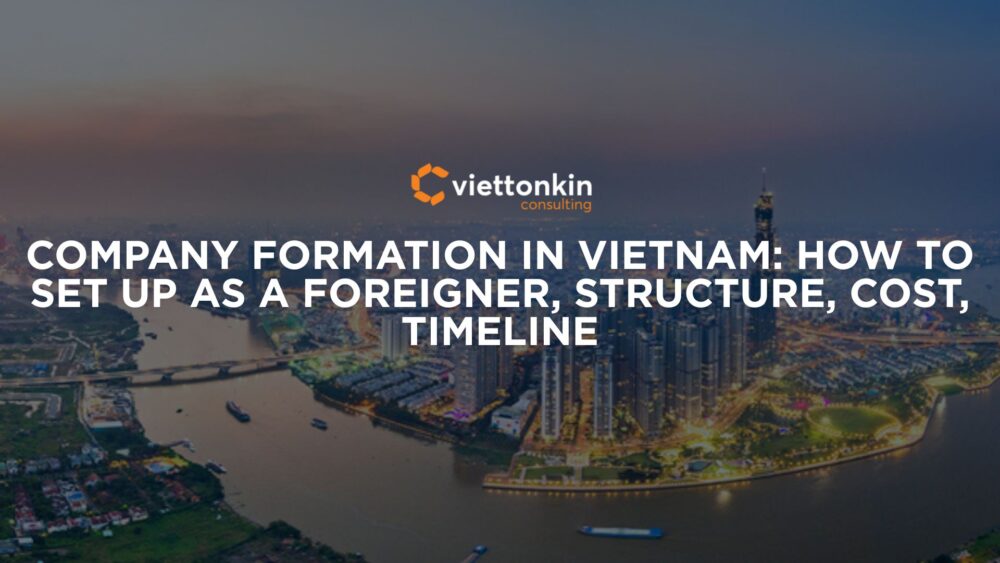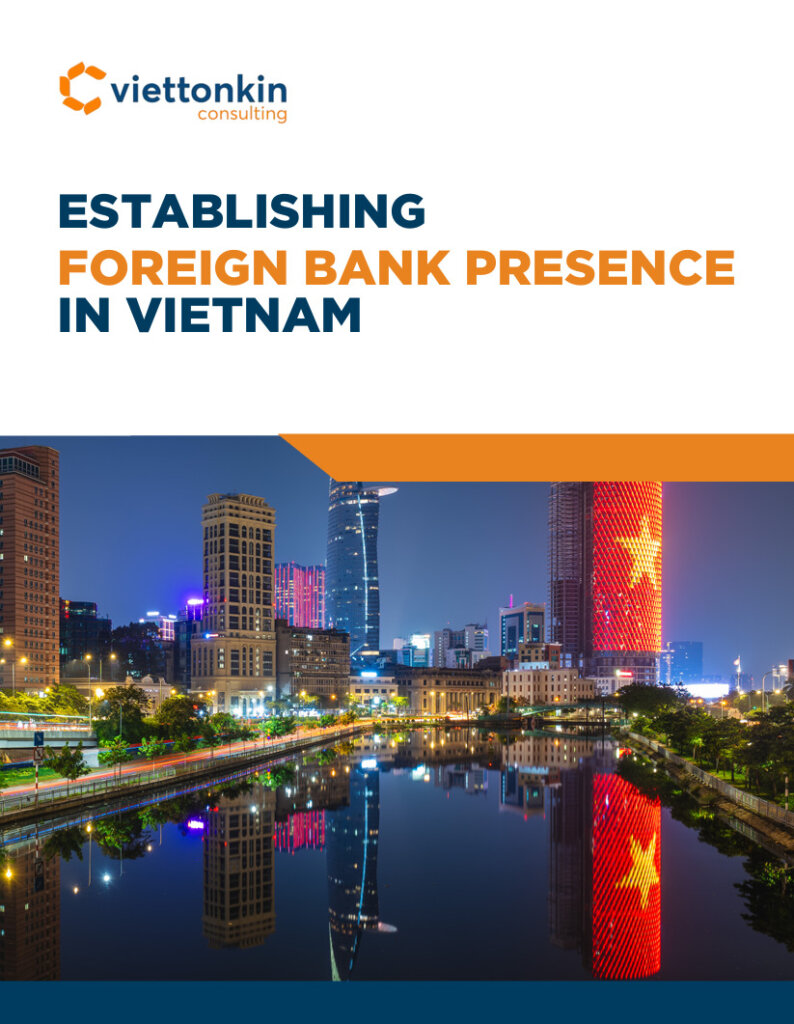Vietnam's food trade industry is one of the most dynamic sectors in the country. Fueled by an expanding middle class, rising disposable incomes, and shifting consumer preferences, the increasing demand for high-quality food products is undeniable. From bustling markets in Ho Chi Minh City to modern supermarkets in other major cities, the opportunity for both […]
Thinking of planting your business flag in Vietnam? You’re in the right place at the right time. For over two decades I’ve guided more than 2,000 companies through the dynamic investment landscapes of ASEAN, and I can tell you that Vietnam’s corporate climate is very open to foreign investment.
But it’s a structured environment. Success here isn’t about finding loopholes; it’s about choosing the right legal structure and executing your entry with precision. For SMEs, startups and established companies looking to unlock their growth potential, this guide will be your roadmap. Market entry in Vietnam requires careful planning and understanding of the regulatory environment.
Key Points
- Foreigners can set up 100% foreign-owned companies in Vietnam in many sectors, mostly as a Limited Liability Company (LLC) or a Joint-Stock Company (JSC).
- Under Investment Law 2020 Art 36 and Enterprise Law 2020 Art 27, the process involves two stages: Investment Registration Certificate (IRC) and Enterprise Registration Certificate (ERC).
- There is no minimum capital for most business lines but you must propose and contribute a “reasonable” amount sufficient to run your business which the authorities will evaluate (per Enterprise Law 2020 Art 35 and Decree 31/2021 Art 6).
- Basic company formation takes 1-3 months but can take longer for conditional business sectors that require additional licenses.
- Post incorporation compliance including tax registration, accounting and statistical reporting is mandatory and critical for long term operation.
- Understanding the Vietnam company formation process, company registration, online onboarding and obtaining necessary permits and licenses is essential for foreign entrepreneurs to ensure compliance and smooth setup.
Introduction: Vietnam’s corporate climate is open. But structured

Foreign ownership is possible, with the right setup
One of the biggest myths about Vietnam is that you absolutely need a local partner. That’s simply not true for most industries, full foreign ownership is allowed in many sectors. The government has created clear pathways for 100% foreign ownership. The key is understanding these pathways and choosing the right one for your business whether you’re launching a tech startup, a manufacturing plant or a consulting firm. It’s not about if you can own your company but how you should structure it.
Who this guide is for: SMEs, startups, regional companies, investors
This guide is for the ambitious, including foreign entrepreneurs. It’s for the founder with a disruptive idea, the regional firm looking for its next growth engine, and the established SME seeking to diversify its supply chain. You see the opportunity in Vietnam’s vibrant economy and you need a clear, no-nonsense plan to make it happen.
Viettonkin’s FDI experience in guiding 2,000+ incorporation journeys
My team at Viettonkin has been on the front lines of Vietnam’s FDI boom. We’ve managed thousands of company formations, from simple representative offices to complex manufacturing setups. This experience gives us a unique perspective. We don’t just know the law; we know how it’s applied in practice. We turn regulatory hurdles into strategic advantages.
We provide full company formation services to support clients throughout the entire incorporation process.
What Types of Companies Can Foreigners Set Up in Vietnam?

Choosing the right business form is the first strategic decision you’ll make as a foreign investor. It’s like choosing the right vehicle for a long journey.
Limited Liability Company (LLC): the default for small/medium firms
LLC is the most common choice for foreign investors and for good reason. A Vietnam limited liability company is a legal entity that offers flexibility, limited liability protection and no minimum share capital requirement, making it attractive for both single founders and groups of partners. It’s flexible, requires fewer administrative formalities and is perfect for a single founder or a small group of partners. There are two types:
- Single-member LLC: Owned by one individual or organization.
- Multi-member LLC: Owned by 2 to 50 members.
For most service-based businesses, tech companies and trading firms, limited liability companies are the most popular business structure for foreign investors in Vietnam.
Joint-Stock Company (JSC): best for fundraising or large ops
If your ambition is to go big, raise capital or list on the stock exchange, JSC is your vehicle. In Vietnam, joint stock companies are a recognized legal structure that allows for share issuance and is subject to specific regulations. A JSC must have at least three shareholders and has a more complex management structure. This is the preferred structure for large-scale manufacturing operations, major real estate projects and any venture that plans to bring in multiple rounds of investment.
Representative Office: no revenue, but market presence
Under Investment Law 2020 Article 45 and Circular 08/2015, a Representative Office (RO) is not a separate legal entity and cannot generate revenue, serving as a non-trading unit for foreign companies. It's ideal for those who want to conduct market research and establish a presence in Vietnam before making a full investment. A low-cost, low-risk way to test the market, an RO allows you to build relationships and gather market intelligence.
Company Formation Requirements for Foreigners
Minimum capital requirements by sector (and what “proof” means)
For most business lines, Vietnam’s Law on Enterprise does not specify a fixed minimum capital. There is generally no minimum share capital or minimum capital requirement for most business lines in Vietnam, giving investors flexibility in determining their initial capital. However, you must propose an amount that is “reasonable” and sufficient to cover your business expenses until it becomes self-sustaining.
Authorities at the Department of Planning and Investment (DPI) will assess this. For certain conditional sectors like finance or real estate, specific minimums do apply. “Proof” of funds isn’t required upfront for the application, but you must contribute the registered capital within 90 days of receiving your business license.
Office lease, bank account and investment registration certificate (IRC)
Before you can apply, you need a few key things in place:
- A Legal Address: You must have a local address or registered office address for company registration in Vietnam. This can be a signed lease agreement for a physical office space or you can use virtual office services for many service businesses.
- Bank Account: You will need to open a capital account in Vietnam to transfer your investment funds.
- Investment Registration Certificate (IRC): This is the first and most critical license. As outlined in a guide by TWL Law Group, this certificate validates your investment project and is issued by the DPI.
Timeline breakdown: IRC (15 days), ERC (5-7 days), tax (2-4 days)
Once your documents are in order, the timeline is fairly predictable for standard business lines. Key documents must be submitted to the business registration office for processing:
- Investment Registration Certificate (IRC): Typically takes 15-20 working days.
- Enterprise Registration Certificate (ERC): After the IRC is issued, this step takes about 5-7 working days. The ERC officially creates your legal entity.
- Post-registration: This includes making the company seal, setting up the bank account and tax registration which takes a few more days.
Step-by-Step: How to Register a Company in Vietnam
Pre-check: business scope, industry code and restrictions
This is the most critical step. You must clearly define your business activities and match them to Vietnam’s official industry codes (VSIC). Getting this wrong is a common reason for application delays or rejections. The importance of verifying that your business lines are open to foreign investment.
Submit to the Department of Planning and Investment (DPI)
Your application dossier, which includes notarized and translated copies of your passport or corporate documents, the lease agreement, your investment project proposal and the company charter, is submitted to the provincial DPI where your company will be located.
Post-registration setup: seal, tax, social insurance, reporting
Receiving your ERC is a major milestone but you’re not done yet. You must then:
- Carve the official company seal.
- Publicly announce your company’s establishment.
- Register for taxes and get a digital signature for tax filing.
- Pay the business license tax which is a mandatory annual fee for all registered companies.
- Register for social insurance for your employees.
Business Licenses and Permits: Sector-Specific Approvals
When a business license is required (beyond incorporation)
For many foreign investors, obtaining the Investment Registration Certificate and Enterprise Registration Certificate is just the beginning. In Vietnam, certain business lines, like finance, healthcare, education and other regulated sectors. Require additional business licenses before you can start operations. For example, a foreign owned company in the financial sector must get a license from the State Bank of Vietnam, while those in healthcare need approval from the Ministry of Health.
The specific license you need depends on your business line and nature of your activities. It’s essential for foreign investors to clarify these requirements early as operating without the proper sector-specific license can result in delays or penalties. Consulting with local authorities or a trusted business consultant can help you map out the exact licensing path for your foreign owned company.
Industry-specific permits and how to get them
Beyond general company registration, many industries in Vietnam require specific permits to operate. Whether you’re entering construction, tourism, manufacturing or other regulated business sectors, you’ll need to get the relevant industry-specific approvals. For example, a construction company must get a construction permit from the local Department of Construction, while a tourism business needs a tourism license from the Vietnam National Administration of Tourism.
The application process involves submitting a comprehensive dossier including your investment registration certificate, business registration certificate and documents proving your financial capacity. Authorities will review your application, assess your compliance with sector regulations and may request additional information before approving. Understanding these requirements and preparing a complete application package is key to a smooth licensing process.
Common pitfalls in the licensing process
Navigating Vietnam’s licensing landscape can be tricky, especially for foreign investors who are not familiar with local regulations. Common pitfalls include submitting incomplete or inaccurate applications, missing required supporting documents or failing to comply with specific regulatory standards for your business line.
These mistakes can lead to costly delays and disrupt your business operations. To avoid these issues, it’s essential to research the licensing requirements for your sector, ensure all documents are accurate and up-to-date and consider working with a local business consultant or lawyer. Being proactive and detail-oriented will help you stay compliant and keep your business running smoothly.
Cost Breakdown for Company Registration in Vietnam
Government fees: IRC, ERC, tax code, legal seal
All Vietnam companies must pay the official government fees for company registration which are minimal and usually less than a few hundred dollars. These are fixed administrative charges for issuing the various certificates and seals.
Legal & advisory: incorporation, translation, nominee support
This is where the bulk of your initial setup cost will be. Professional advisory fees for managing the entire incorporation process including accounting services, document translation, notarization and liaising with government authorities are an essential investment to ensure a smooth and successful setup.
Setup expenses: virtual office, admin, notary
Don’t forget the practical costs. You’ll need to budget for the first few months of rent (or a virtual office service), notary fees for authenticating documents and other small administrative expenses.
Foreign Ownership Limits and Sector-Specific Rules
100% ownership sectors (e.g. IT, consulting, manufacturing)
The good news is that many sectors are 100% open to local and foreign investors. This includes most IT services, management consulting, software development and manufacturing for export. This is a key driver of Vietnam’s FDI attraction.
Conditional sectors: retail, logistics, F&B, advertising
Some sectors are considered “conditional” meaning they have specific requirements or ownership caps. For example, setting up a retail outlet requires additional licenses and some logistics services have foreign ownership limits under Vietnam’s WTO commitments. In these conditional sectors, forming a joint venture with a local partner is a common option for foreign investors to meet regulatory requirements. Navigating these sectors requires expert legal knowledge.
After Registration: Compliance & Operational Readiness
Monthly and annual tax filings
Your compliance journey starts the moment your company is registered. You will be required to file monthly or quarterly Value Added Tax (VAT) and other tax reports and an annual final tax return.
Accounting, payroll, audit obligations
You must maintain a proper accounting system that complies with Vietnamese Accounting Standards (VAS). Your company must file audited financial statements annually which must be audited by a licensed firm in Vietnam. Payroll processing must also comply with local labor laws and social insurance contribution requirements.
Local director and HR registration expectations
Every company in Vietnam must have one or more legal representatives who reside in the country. These legal representatives have significant legal authority and responsibility. As your team grows, you’ll need to register labor contracts and comply with all HR regulations. A crucial but often overlooked requirement, highlighted by LuatVietnam English in a 2025 bulletin, is the need for FDI companies to comply with specific statistical reporting regimes, showing the government’s close monitoring of foreign investment activities.
Marketing and Market Research: Building Your Brand in Vietnam

Understanding the Vietnamese market landscape
For foreign investors setting up a company in Vietnam, understanding the local market landscape is a crucial step towards long-term success. Vietnam’s economy is growing fast, driven by a young, tech-savvy population and a growing middle class with increasing purchasing power. Demand is strong in consumer-driven sectors such as retail, hospitality and healthcare. To tap into these opportunities, foreign investors should prioritise market research, gathering insights through surveys, focus groups and analysis of market trends and consumer behaviour.
This research will help you identify the right business lines, tailor your offerings to local preferences and craft marketing strategies that resonate with Vietnamese consumers. By investing in thorough market research from the start, you’ll be better positioned to build a strong brand and achieve sustainable growth in Vietnam’s dynamic business environment.
How Viettonkin Simplifies Company Formation in Vietnam
Incorporation + legal + tax + HR under one ASEAN-aligned umbrella
We do it all under one umbrella
We don’t just handle your incorporation paperwork; we build your entire operational foundation. We support company members in fulfilling their legal and compliance obligations, ensuring all required documentation and internal structure requirements are met. From legal advisory and tax registration to ongoing payroll and compliance, we are your single point of contact, ensuring every piece of your business setup is aligned and risk-proof.
Example: Supporting a Singaporean SaaS firm with 2-entity rollout
We recently helped a foreign company, a Singaporean SaaS firm, with its expansion into Vietnam. Their strategy required a dual entity: a sales and marketing office to drive revenue and a separate R&D centre to leverage Vietnam’s tech talent. We structured and executed the formation of both companies in parallel, ensuring full compliance and operational readiness from day one.
After Registration: It’s Just the Beginning
Reframe: Incorporation = activation of long-term strategy
Getting your business license is not the finish line; it’s the starting gun. It’s the moment your long-term strategy for growth in one of the world’s most exciting markets is activated. The charter capital contribution is a key step in activating your long-term strategy, as it provides the mandatory initial funding required for company registration. The choices you make during the formation process will set the foundation for your success for years to come.
Book a market-readiness and entity advisory call
Ready to make your Vietnam dream a reality? Insight turns challenges into opportunities. Work with us for a long-term and prosperous future. Book a market-readiness and entity advisory call today to discuss foreign and local company formation.
Viettonkin your cross-border FDI partner in Vietnam
Over 15 years, Viettonkin has been the go-to partner for foreign and local companies in ASEAN. We provide the legal, financial and strategic support to build and grow a business in Vietnam. Your path to growth starts here.
You might also like: FDI Company in Vietnam—What Foreign Investors Need to Know Before Setting Up












